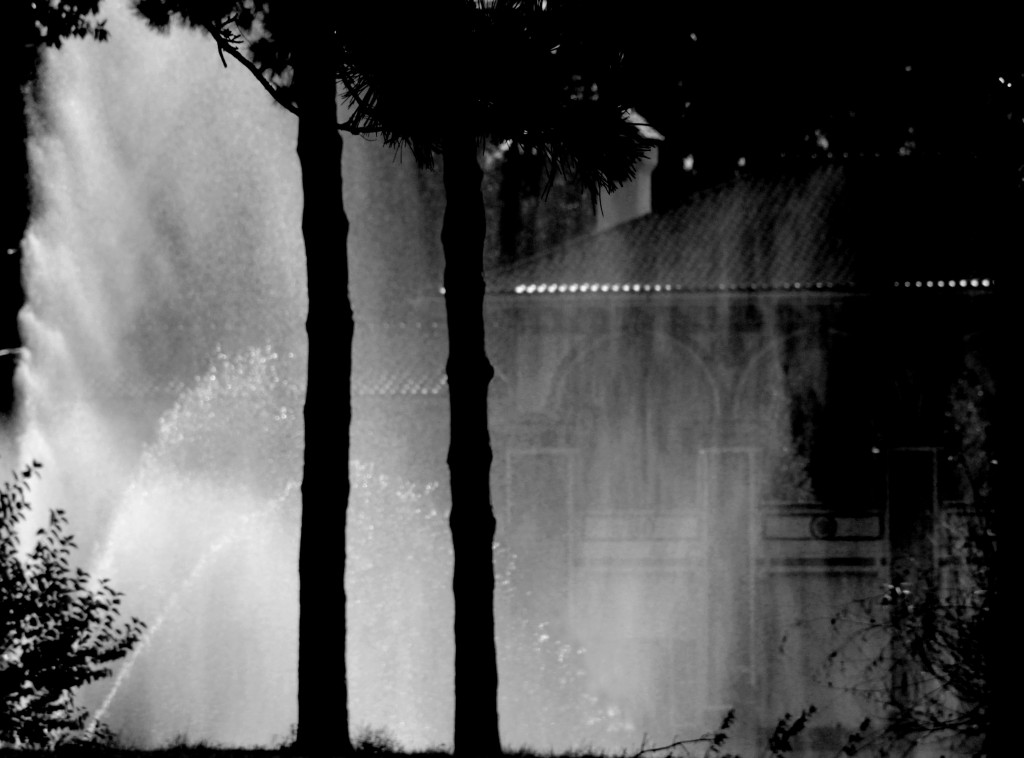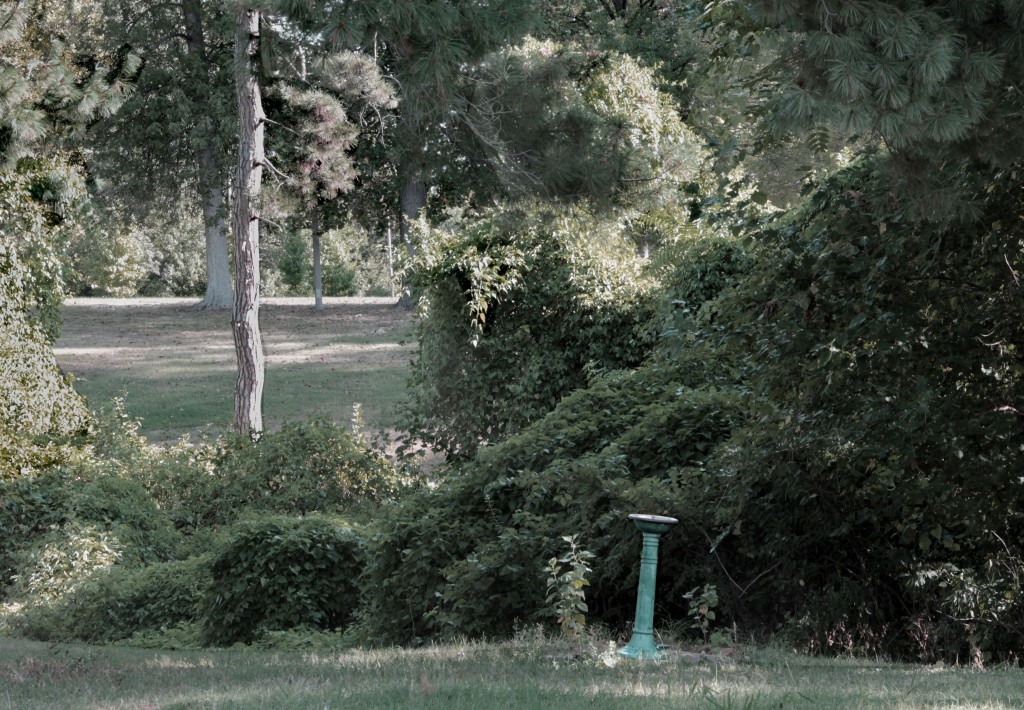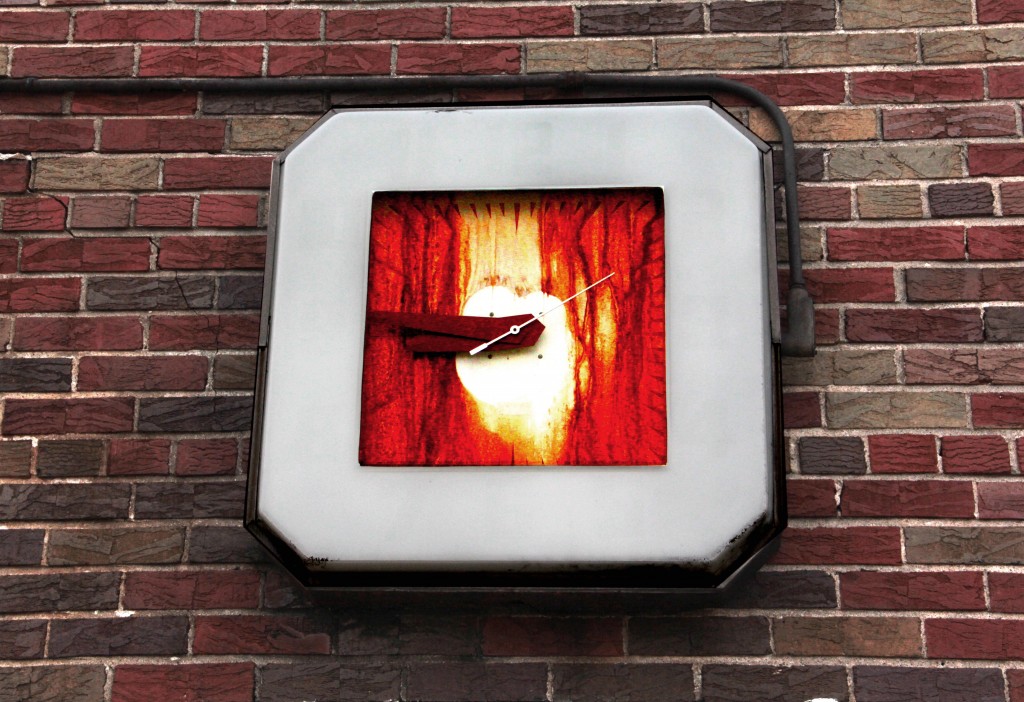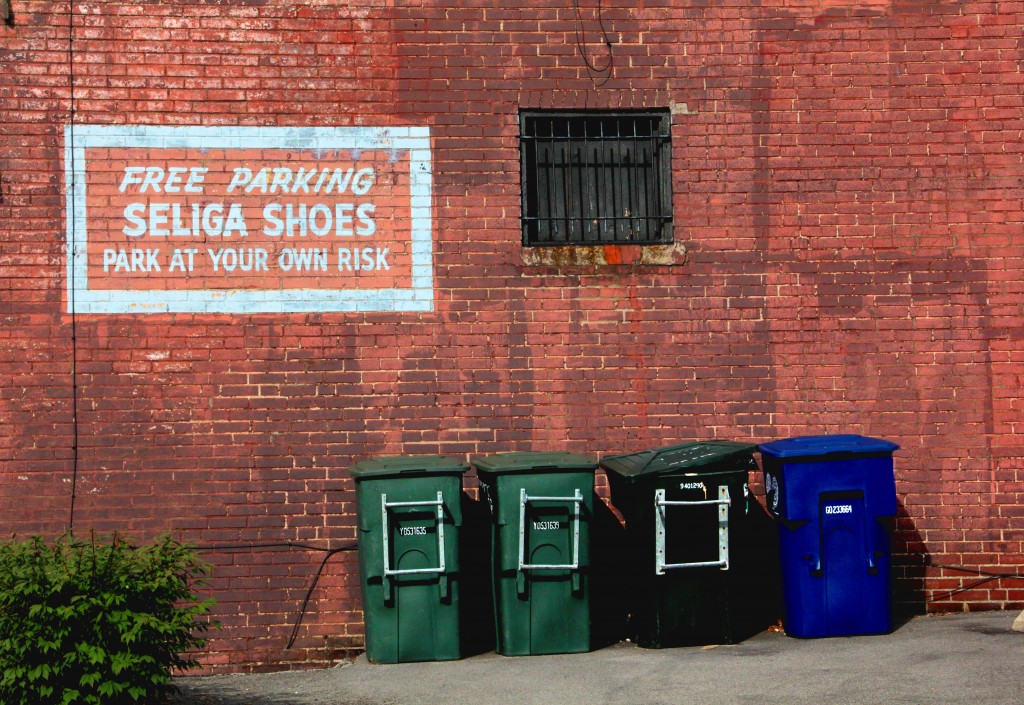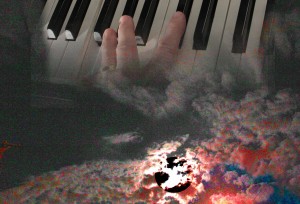
Category: Life
-
New Directions
I’m attending Bouchercon this week, here in St. Louis. In the last few years I’ve been drifting toward crime fiction, partly in an attempt to cultivate new fields with a view toward getting my rather stagnant career moving, partly because I’ve always written something like it.
The Robot Mysteries were, as advertised, mysteries of a sort. Crime was happening in them, investigators investigated, macabre stuff occurred. There was a bit of it in Metal of Night and a couple of major thefts (and murders) were integral to Peace & Memory. Certain Remains was a mystery, even with noir elements, and the one, poor orphaned Terminator novel I wrote, Hour of the Wolf, was very noirish in tone.
The alternate history, now making its newly-launched circuit in search of publisher, is very much a murder mystery, wrapped around a bit of steampunk. I moved on from there to write a novel set in the 18th Century that is pretty much a murder mystery and the last book I finished is a straight up and down contemporary murder mystery. Plans exist to continue all three into future novels.
So when I wondered to my agent if I should maybe attend Bouchercon (after being reminded by good pal Scott Phillips that it was, y’know, right here in town this year) I got a loud, forceful “Well, yeah!”
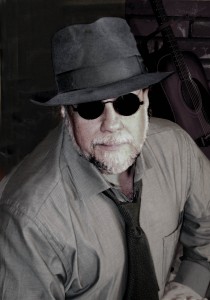 So in view of a potential new career, I’m updating my image a bit, trying it on for size, as it were, and seeing how it fits. I asked Scott what to expect and he said “Well, for one thing, there are no costumes.”
So in view of a potential new career, I’m updating my image a bit, trying it on for size, as it were, and seeing how it fits. I asked Scott what to expect and he said “Well, for one thing, there are no costumes.”“Yeah,” I said, “but really all we have to do is dress well and we’re in costume.”
To which he laughed and informed me that on average the women dress to the nines and the guys show up in jeans and t-shirts.
Well. I think I’ll just go as myself.
But there are so many of them that it can be hard to choose…
Tonight the festivities kick off with a pre-Bouchercon get-together in University City at a place called Meshuggah’s where monthly readings take place, a gig called Noir at the Bar. I’ll be there.
So will my new agent. (One of them, that is—I have two, which is kind of…wow.) Yeah, despite my attempt at a cool demeanor, I’m jazzed about that. Of all the “agents” I’ve had, I have only ever met two of them, both shortly before they left their respective agencies and me.
Anyway, I probably won’t post anything till next week. I’m stepping off the platform to head in a new direction. Here’s hoping it takes me where I want to go.
-
9/12
I didn’t write anything for yesterday’s commemoration. Many others, most far better suited to memorializing the day, said a great deal. My paltry mutterings would add little to what is, really, a personal day for most of us. Like all the big anniversary events, the “where were you when” aspect makes it personal and maybe that’s the most important part, I don’t know.
Instead it occurred to me to say something about the element of the disaster that puzzles most of us, even while most of us exhibit the very trait that disturbs us deeply in this context. One of the most common questions asked at the time and still today is in the top 10 is: how could those men do that?
Meaning, of course, how could they abandon what we consider personal conscience and common humanity to perpetrate horrible destruction at the cost of their own lives.
The simple answer is also the most complex: they were following a leader.
I’m going to string together what may seem unrelated observations now to make a larger point and I will try to corral it all together by the end to bring it to that point.
Firstly, with regards to the military, there are clear-cut lines of obligation set forth, the chief one being a soldier’s oath to defend the constitution. There is a code of conduct consistent with that and we have seen many instances where an officer has elected to disobey orders he or she deems illegal or immoral. There is a tradition of assuming that not only does a soldier have a right to act upon conscience, but that there is an institutional duty to back that right up. The purpose of making the oath one to the constitution (rather than to, say, the president or even to congress) first is to take the personal loyalty issue out of the equation.
To underline this a bit more, a bit of history. The German army prior to WWII was similarly obligated to the state. German soldiers gave an oath to protect Germany and obey its laws. Hitler changed that, making it an oath to him, personally, the Fuhrer. (He left in place a rule explicitly obligating the German soldier to disobey illegal or immoral orders.)
Unfortunately, human nature is not so geared that people find it particularly easy to dedicate themselves to an abstract without there also being a person representing it. (We see this often in small ways, especially politically, when someone who has been advocating what is on its own a good idea suddenly comes under a cloud of suspicion. Not only do people remove their support of that person but the idea is tainted as well. People have difficulty separating out the idea from the person. The reverse is less common, that a bad idea taints a popular leader.) Dedicating yourself to supporting the constitution sounds simple in a civics class, but in real life people tend to follow people. (Consider the case of Ollie North, whose dedication to Reagan trumped his legal responsibility to uphold the constitution and its legally binding requirement that he obey congress.)
Next example. Many years ago, when I was still a teenager looking for a job, I answered an ad for a salesman position. When I arrived for the interview I found myself in a large room with a group of people all of whom were receiving a sales pitch for the product by one man, who was doing a first-rate job of boosterism for it. It was a reference book, maybe even an encyclopedia, I don’t clearly remember. But his pitch was to our potential to make a lot of money selling this product, that it required dedication and belief in ourselves and what we were selling. He was a good speaker, he got people fired up.
But he didn’t say much about the product. My questions concerned that and what it would mean for the consumer, but except for the most cursory description, he talked very little about it. He summed up his twenty minute pep talk by asking if there was anyone still not convinced this would be a good job. I and a couple others raised our hands. When I did so, I expected to be given an opportunity to ask about the product.
Instead, he gave us a sad look and said “Well, then I’m afraid I’m going to have to ask you to leave.”
I was stunned and, by the expressions on the faces of the others who’d raised their hands, so were my fellow skeptics. I said, “You’re not going to ask why?”
“Please leave,” was all he said.
Dazed, we left. I realized much later that what he—his company—were looking for were people who, for their own self-betterment, would be willing to sell anything to anyone. They did not want skeptics. It might have been the greatest encyclopedia on the planet, but that didn’t matter.
The Joyce Meyer Ministries are in town this week, apparently. This is an institution that makes an overt connection between religious fealty and material success. People give great amounts of money to it to “spread the word” and some of them achieve a certain amount of success. As with other grandstanding televangelists, the claim is certainly true for herself, her family, and closest associates, but many people have given everything to her and ended up with nothing. The deeper question, though, is why would anyone continue to give to her institution if, as she claims, it is faith that actually pays off? Can’t that be handled privately? Or in another church or institution?
Which of course leads one to wonder at the elasticity of the faithful with regards to those ministers who have been exposed as frauds. I have no real question as to the motives of people like Jim Bakker or Ted Haggerty or Jimmy Swaggart or even Oral Roberts and Pat Robertson. I do have deep questions about those who continue to follow them despite revelations of impropriety and fiscal deceit and self-aggrandizement.
I had a customer once who was part of the Democratic Party machine in St. Louis and as long as you weren’t talking about politics he was a good guy. But when elections were upon us, he would come in an just go on about this candidate or that, and always with the same “We’ve got to see him elected!” One year he was working on behalf of someone who had obvious credibility problems (and later was indicted), but his dedication was absolute. When I pointed out the problems with the candidate, he just looked at me like I had lost my mind. “But the alternative is a Republican!” So what? I said. Better an honest Republican than a crook. The subsequent harangue I received made it clear that it did not matter who the candidate was or what he or she did, as long as they were Democratic there was simply no question of his support.
I watched people I knew become absolutely enamored of Ronald Reagan, almost from the start. As his presidency went on and problems emerged, some simply would not abandon him. They had dedicated themselves to the man and it didn’t matter what he did. He made them feel “like a real American.” There are people still who think Nixon was framed and those still who, despite detailed information about his personal life and his presidential decisions think that Kennedy walked on water. No doubt there will be those who think Bush was one of the greatest presidents ever.
When we ask ourselves about the motives behind 911, this all-t00-human flaw must be at the top of the list. The men who hi-jacked those planes and wreaked all that havoc had been living here. They saw the people in their neighborhoods, they spoke to us, they breathed our air—and while I am not one of those who sycophantically hold the United States up as the shining model of political perfection and social maturity, by comparison this is a free country, a good country (which makes our failings and shortcomings all the more painful, because we have fewer excuses)—and yet they did that. It is legitimate to ask “where were their consciences? Where was their skepticism? Where was their ability to make valid judgments?”
Many would like to believe that such men are so different that they cannot be understood. They weren’t rational, they weren’t “normal,” they weren’t Like Us.
No? How many of us questioned Bush’s program? How many of us on this day ten years ago would not have backed his program? Even in Congress, very few stood up to say “Wait a minute, what are we doing?”
Yes, I know, it’s more complicated than that. And it is. But then, it’s more complicated for the other guy, too. And yet, it comes down to something very similar—go where the leader tells you to, do what the leader orders. Ask no questions, after all the leader knows best.
Cults work because people want to follow a leader. They have little trust in their own decision-making abilities, little confidence in their own ideas, even their own personalities. On some level, the need for validation from a guru is essential for their ability to even get out of bed in the morning. And I’m not talking about Moonies or Krishna or even the Sword and the Arm of the Lord or Aryan Nation, I’m talking about ordinary people with normal lives who dedicate a part of their psyches to an external source of affirmation. It can be anything from a favorite musical group to a politician to a preacher, or even something as intimate as a lover or a friend, or something both intimate and impersonal, like AA or Alanon or a survivor’s support group. What makes this hard is that the tendency is not always bad but sometimes is very positive, very necessary.
It is all-too-easy to hand over too much of yourself to someone else because it is easier than doing the necessary work for yourself. Most of us do something like this at one time or another, probably a lot of us transfer our dedication from one thing (or person) to another regularly, in a kind of psychic load-sharing routine. But some of us simply invest everything in one place, one person, and surrender our ability, even our right, to withdraw, to question, to say no when a demand becomes unreasonable or the relationship toxic.
I don’t believe in people that way. I don’t believe in anything that way. I don’t draw my validation from a blind commitment to a guru. I did at one time but I grew out of it and now I find it bizarre when I encounter someone who does that to the point of being unable to accept criticism of the little god at the center of their being.
Which has led me to understand a reaction I’ve had for a long time. Maybe we’ve all felt this. When someone comes up to you and starts going on about how so-and-so or this-and-that saved their life, is the greatest thing ever, is the reason they function, I—and probably most everyone—automatically pull back, suspicious and a bit uncomfortable at the protestations of fealty. I get uncomfortable around the hyper-patriotic and the extremely religious who insist on telling you how much they love their country or their god. I wrote a little about that here. I feel, justifiably or not, that they aren’t quite rational about this and maybe not quite reliable. If the choice came between doing what was right and following their guru into hell, what would they do?
I don’t like that feeling, but I think I understand it now. That level of dedication to something external suggests to me that they aren’t all there, that they’re using that dedication to make up for an absence of Self, and not just any self, but the self that can act independently of blind faith. I find I don’t entirely trust them.
And it could be a lack of trust about almost anything. When faced with that kind of dedication, I find myself almost automatically shutting down certain lines of communication, self-censoring, placing certain topics off-limits. I don’t know what kind of reaction I’ll get if I say certain things. I don’t know what this person will do if they feel I threaten their guru. Most likely cut off similar lines of communications with me.
But that apparent inability to separate out a personal zone of skeptical self-awareness from the object of their obsession tells me that they will not always act on rational premises. Actions may take the form of insisting certain books be removed from library shelves all the way to…flying planes into skyscrapers.
The 911 hijackers had to indulge a kind of interpretive censorship about everything they saw or heard in this country during their stay. But it was an interpretation based not on their personal standards of right and wrong, their own skeptical assessment, but on what they had been told they would see by their guru. Their guru used their culture to reinforce his vision and they had surrendered enough of themselves to his vision that they committed an atrocity.
The difficulty in all this is that we all interpret things based on who we listen to and what we’ve heard. What the hijackers did, up until the moment they boarded those planes, was not particularly different from what any group does that is dedicated to a cause that seems to run counter to the larger culture. Eco-terrorists go through the same processes.
I have always held myself apart from the influence of gurus. Or tried to. I will use my own judgment, thank you, and often it puts me at odds with momentary protestations of fealty for ideas or persons that I might even agree with, at least in part. It’s hard work, continually reassessing—which part is me and which is them—and I can understand the impulse of hermits to extract themselves entirely from a culture in order to try to find which is which. But that doesn’t work, either, because we need feedback in order to perfect judgment.
The lesson of 911 for me was not new but came with added force: it is never good to follow a guru. You may agree with someone, work with someone, associate yourself with their ideas, even like them, but trailing along after them like children after the Piper is never good. Because you must always be able, when they one day turn to you and say “You have go do X for the cause,” to tell them no. You have to be able to do so even if you don’t. You may judge that what they’ve told you to do is a good idea—but you must make your own judgment. It’s a pretty safe bet that if they tell you to go kill a bunch of people in the name of X, they do not have your or anyone else’s best interests at heart.
That goes for gurus, cults, churches, and governments.
-
Fiction Matters
What I do puzzles some people. Always has, even before I was doing it. All those jokes about bookworms have a solid basis in real experiences—a great many people in our lives do not understand the importance of reading. Worse, they have no clue about the pleasures of reading, which often makes me very sad.
I was followed around the play ground at school once by three of my classmates who were determined to stop me from reading. I don’t even remember the book anymore, only that I had finally found a way to enjoy recess, one that took me out of the rough-and-tumble of schoolyard hierarchical nonsense. But after a couple of months of slipping out of the actual, fenced-in playground and finding a spot behind the bushes fronting the stone wall of the church and sitting there till the bell with a book, a trio of “friends” found me and took my book away. You can imagine the game of keep-away that ensued, a game I never won. The teacher caught us—we were technically out of the playground, which was a no-no—and the issue was resolved, as far as I’m concerned, in their favor: I had to return to the general population. (This kind of thing happened all the time, every time I thought I’d found a way to avoid having to be Out There with the rest of them. Always the kids making it difficult for me ended up losing me my privilege. Taught me a lot about how power works in a bureaucracy.)
Anyway, I kept trying and found new places to hide and these same three kept rousting me out and taking my book away. Finally I found a place inside the school, up in a room above the stage in the gymnasium that no one else seemed to know about. They never found me there.
But my point is, they just didn’t get it. Even those who didn’t ridicule me about it tended to be baffled. What, you’re reading a book? For fun? (To be fair, right about age 13, several of the girls “got it” and for a brief time I was popular with them because I provided them with books they otherwise might never have gotten their hands on.)
So now I write. Most of the people I associate with now are either writers or readers. My “group” if you will includes almost no one who doesn’t read. But I don’t live under a rock so I do run into people from time to time who exhibit dismay at the very idea of writing fiction.
Well, The Guardian has an article which provides some ammunition against such dismay. Seems reading fiction promotes empathy. Interesting, that. In a country in which reading for pleasure is a minority indulgence, all you have to do is look around at the current political landscape and notice how much this may explain.
Of course, to those of us who’ve been reading since we were old enough to hold a book in our lap this is nothing new. It’s just nice to have it recognized.
(Although I must admit that my empathy for those assholes who tormented me in school has never been much more than formal or, shall we say, academic?)
-
Carondolet Park
The heat wave finally broke and this past weekend we took the dog and went through nearby Carondolet Park, which over the years has become our favorite to stroll. Driving through I often see all kinds of photographic possibilities, and then, when I return with the camera, I can’t find most of them.
But I did get some this time, so I thought I’d just put up a selection. Something apolitical, pleasant, interesting, visually stimulating, etc.
So….
-
Necessary Notes
Couple of things. One, as noted in the previous post, I’m going to Bouchercon, here in St. Louis this year. The other event coming up—well, Archon, of course, the first weekend of October, but I always try to be there—will be the local independent bookstores bus tour on October 22nd, via St. Louis Alliance. I’ll be at the Book House on Manchester Road from 11:00 AM on and then with readers for lunch. Check the Alliance web page for details.
Today I spent doing some catch-up stuff. Company left this morning, so I cleaned up a bit, walked the dog, then got together with Scott Phillips in U City for coffee. Scott’s a great guy and I owe him for hooking me up with my new agent. He has a new novel out and I urge you all to find it, buy it, read it. The Adjustment is prime Scott, quirky, disturbing, funny, and utterly unclassifiable. (And although I have provided the Amazon link, please buy it from a local, preferably independent bookstore. If you don’t, I’ll know, or I know people who will know, and once they know, well…)
After that, heading back home, I took a detour to visit a friend I don’t see enough of. Vicky was home and we spent an hour or so visiting, something I need to do more often. I’ve known Vicky for mumbles%handovermouth*muffle muffle years and, as with others, time has sort of slipped away and too much has gone by without enough contact. Yeah, I’ve been busy (and sometimes just in no kinda mood to be friendly with anyone) and so has she, but friends are friends and there’s no real excuse. If you delay and accept the excuses, one day you go back and find the place overgrown, abandoned, the windows busted, and the door boarded up.

After The Sale Anyway, I’m back home now (obviously) and doing some more cleaning up and getting a bit annoyed at myself for being disorganized. There’s more fiction to write, some music to do, and—at the moment perhaps most importantly—a nap that needs taking. I can see it, right there, lying out in the open, unguarded. All I need to do is reach out when no one is looking and take it.
-
Just Getting Up In The Morning
Really, I’ve been up since 5:20 already. We have company coming into town, so most of the day so far has been taken up with cleaning the house and arranging the guest room—which is at all other times my office.
But I sometimes feel that just being able to get up in the morning and do anything constructive is a minor miracle. Oh, nothing significant about that thought. Usually it’s a matter of choosing among several options and then deciding whether I have either the imagination or the energy to tackle any of them. I often have a period of enervation after completing a novel and the older I get the more intense they seem to be.
 I didn’t go to the gym this morning as I normally would have because of the incoming company and other scheduling conflicts. I’d decided that before I found out about the company, but now I wonder if I’ll manage it Wednesday. It is too easy to get into a habit of blowing off certain tasks for later. For instance, I keep meaning to write a new short story (started one yesterday, much to my dismay) or pull out the half dozen I have in rough draft and get them in shape. As long as there is a novel in process, I can feel righteous about putting them off. But I have no excuse now other than just not feeling like it.
I didn’t go to the gym this morning as I normally would have because of the incoming company and other scheduling conflicts. I’d decided that before I found out about the company, but now I wonder if I’ll manage it Wednesday. It is too easy to get into a habit of blowing off certain tasks for later. For instance, I keep meaning to write a new short story (started one yesterday, much to my dismay) or pull out the half dozen I have in rough draft and get them in shape. As long as there is a novel in process, I can feel righteous about putting them off. But I have no excuse now other than just not feeling like it.Not to mention all the things around the house that need tending to. I do a fair job of keeping up with the entropy, but some things slip by and when I get around to them they have grown in size to unmanageable proportions. I have to work up to tackling them. So far, I always do, but there may come a day…
I’m going to Bouchercon. Since at least two of the projects I have under submission to my new agent (did I tell you about my new agent? I’m sure I did) are mysteries—though in truth at least half my oeuvre to date has been a hybrid of SF and mystery (I mean, it even says so on the cover of Mirage, Chimera, and Aurora, an Asimov Robot Mystery), and there are even some noirish aspects to Remains—it seemed sensible to bite the bullet and go to the mystery convention, especially since it’s going to be here, in St. Louis. The plus also is I get to meet my new agent (did I tell you about my new agent? Oh, yeah, I did) face to face.
 It’s been feeling like this year a number of things are going to get fixed. All this getting up in the morning has to count for something, right? But one thing I’ve discovered for certain, and it’s something that had been bothering me—I still love to write. Since March I have been working long days on two of my novels, both of which have received major revisions. Hell, the first one was gutted like a fish and rebuilt almost from the bottom up. But because it felt like it was going somewhere, that something was going to come of it, I dived in and had a ball. This was important. I needed to know this, thought I’d been putting off even asking the question.
It’s been feeling like this year a number of things are going to get fixed. All this getting up in the morning has to count for something, right? But one thing I’ve discovered for certain, and it’s something that had been bothering me—I still love to write. Since March I have been working long days on two of my novels, both of which have received major revisions. Hell, the first one was gutted like a fish and rebuilt almost from the bottom up. But because it felt like it was going somewhere, that something was going to come of it, I dived in and had a ball. This was important. I needed to know this, thought I’d been putting off even asking the question.So getting up in the morning, while still occasionally a pain, has renewed meaning for me. There’s a point to all this effort and that makes a huge difference. Good may yet come of all this.
I do need to make better use of my time. But that’s always been true. So for now, adieu. I’m off to make time bleed a little and get some more done.
-
Our Dreams Are Sleeping
Neil DeGrasse Tyson is my favorite science pop star. He is right up there with Stephen Jay Gould and Carl Sagan in terms of ability and scope and style when it comes to explaining science to the public. I’ve heard that a follow-up mini-series to Sagan’s superb Cosmos is in the works with Tyson as the narrator.
After this, I have to say, I love this guy:
Back in the Seventies, Robert A. Heinlein testified before congress about the benefits of the space program—the ones people don’t generally know about. Among some of them was the surprising fact that suicides among seniors was sharply down since the Gemini program and the announcement of the Apollo program. Years later I noted that suicides were back up after several cancellations.
We do not pay enough attention to dreams anymore. I don’t know what happened to us. Even in the dark days of McCarthyism we dreamed big dreams. What, have we suffered exhaustion? Possibly. But the more we gut the things that make people give a damn about getting up tomorrow, the worse everything is going to be. It is not all about money, as some would have us believe. Money is a tool. What are we doing with it? One part of our society seems bent on destroying the mechanisms of improvement for the average American while the other part seems unable to make a stand and say stop the carnage. One part has convinced another part that the problem is all about government redistribution of wealth and we should end entitlements and cut out all this useless spending and let private enterprise do everything. As far as I can see, right now, all private enterprise is interested in doing is building more casinos and feeding larger dividends to people who don’t want to pay taxes to support the dreams of the country.
It might help, though, if we actually had some dreams again. Time to wake them up and let them play. Before we forget how.
-
Playing Jazz, part three
Steel-trap smiles made room on the stage, a shuffle of seats, a place where chances die or lives are made, all the welcome of the seen-it-befores and the willingly-impressed, squeezed into a need for the new, hope for discovery, and fear of not-good-enough.
The room itself prepared for betrayal, but the ears plugged back into the main artery, on the off that something might open a vein or just shut out the silence.
The Kid opened his case and took out a pair of hands. Everyone gasped at the tendons and callouses, the length of the reach and the curl of long use. He attached them and flexed them and came up to the group and sat down with a comfort way past his years.
Staves crossed, he danced over a brief history of composition, plainsong to Bach and right over romance he played straight into cool. I heard chords buried under atonal cadences, squeezed between whole-tone and free jazz, unplayed references to Jellyroll, stride, Lester Brown, syncopated against voices lofted on solid riffs, the gifts of Bird found one long, strung-out night, reforming on Miles, scampering with Chick and Herbie, and soaring to Bop.
He told us: sevenths took me out of thirds and they expelled me from the nursery. On the street a big smiling wind showed me how to flatten my fifths and from there it was only a bus ride to the Village and the Vanguard and Birdland. In the lower shoals, all eddied with mist and restless listening, the minor blues found release in an augmented major cool that fused with a life beat ignored by the timid, scorned by the comfortable, and recovered by archaeologists of ancient sighs. It talked to me, whispered secrets, and taught me how to read the palimpsests of harmonies down to the bare rock surface of the first language. I can tell you this much, what I’ve gleaned from all those notes passed sub rosa between classes, that it’s nothing alone and everything together.
It’s the conversation that counts, the contact that matters, so talk to me now and let’s play some jazz.
